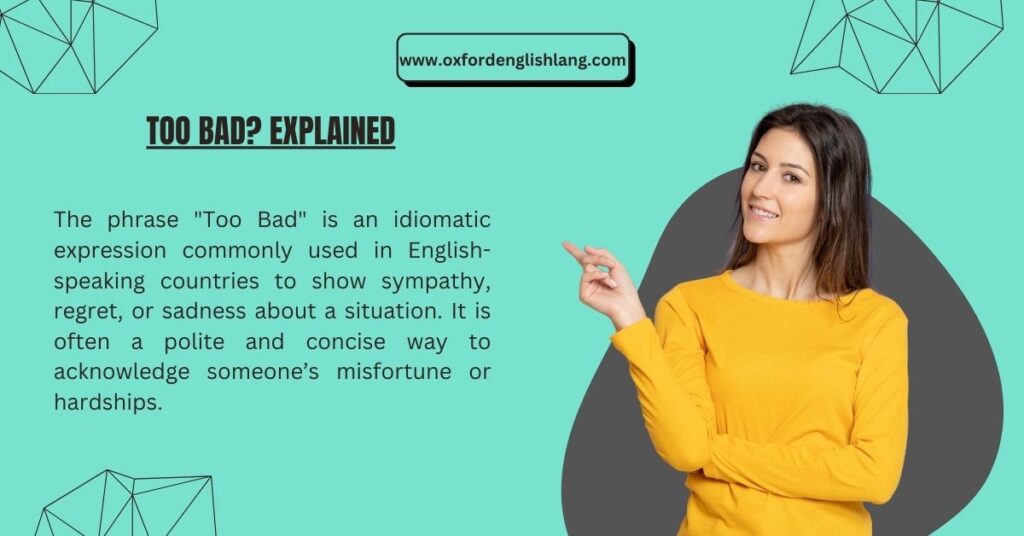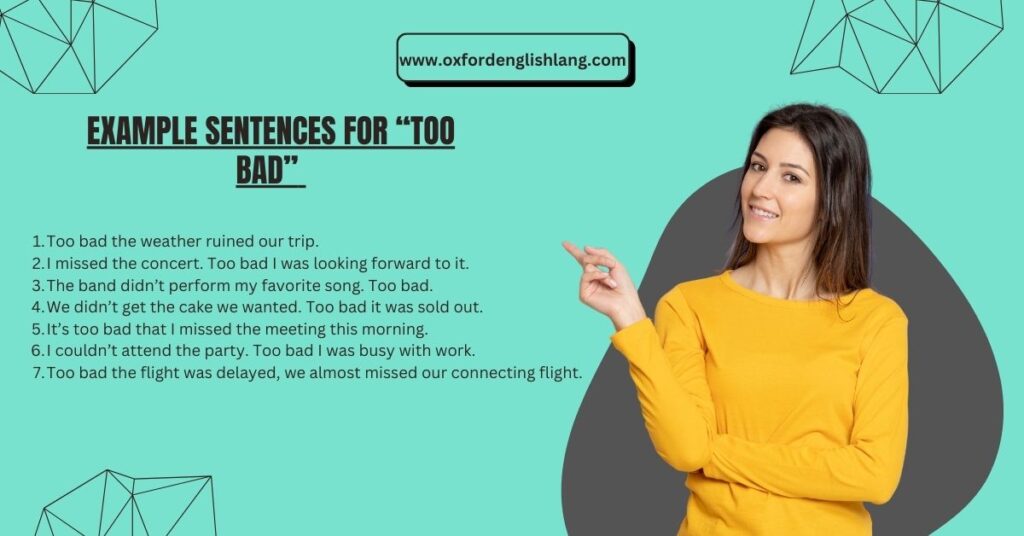The English language can feel like a labyrinth of phrases and rules, especially when navigating expressions like “Too Bad” and “To Bad.” These terms may sound similar, but they are not interchangeably used.
The idiomatic phrase “Too Bad” is often used to show sympathy or acknowledge someone’s disappointment about an outcome, like missing out on a job. The tone of this expression can vary from empathetic to casual or even dismissive, depending on the context of the conversation.
While it may seem puzzling, understanding the nuances of these words is key to avoiding confusion. A blog or post that provides examples and encourages practice can help clarify this standard part of language. Whether you’re learning for a test or just want to improve your understanding, the ability to express yourself with precision is essential.
To Bad Or Too Bad? Which one is Correct
Too Bad is the correct phrase. The phrase “Too Bad” is idiomatic and used to show sympathy or describe a regrettable situation. It can also express indifference depending on the context. The term “To Bad” is incorrect because “to” is a preposition that always pairs with a verb, while “bad” is an adjective.
Too Bad: Explained

The phrase “Too Bad” is an idiomatic expression commonly used in English-speaking countries to show sympathy, regret, or sadness about a situation. It is often a polite and concise way to acknowledge someone’s misfortune or hardships.
For example, if someone missed a bus, you might say, “Oh, too bad you missed it.” This response conveys empathy and understanding without being overly emotional. The phrase is versatile and works well in both formal and informal contexts, making it a simple yet effective way to support someone going through tough times.
In everyday conversations, “Too Bad” can be used to express solidarity during challenges or adversity. It helps to console someone dealing with setbacks, showing that you care about their well-being.
This expression fits into various contexts, whether reacting to news of an undesirable outcome or offering comfort during difficult situations. Its cultural acceptance as a way to address struggles makes it a valuable tool in fostering understanding and compassion.
Where does Too Bad come from?
The phrase “too bad” has been around for centuries in the English language. It is used to express disappointment or regret about an unfortunate or undesirable situation. While both “to bad” and “too bad” are common, only “too bad” is grammatically correct. The phrase is an idiomatic expression that is used to show sympathy when something bad has happened.
For example, when it rained on a picnic day, people might say, “Too bad.” It’s important to double-check grammar and ensure you’re using the correct phrase in the right context.
Example sentences for “Too Bad”

Here are some examples showing how to use “too bad” within sentences:
- Too bad the weather ruined our trip.
- I missed the concert. Too bad I was looking forward to it.
- The band didn’t perform my favorite song. Too bad.
- We didn’t get the cake we wanted. Too bad it was sold out.
- It’s too bad that I missed the meeting this morning.
- I couldn’t attend the party. Too bad I was busy with work.
- Too bad the flight was delayed, we almost missed our connecting flight.
- The movie was a bit disappointing. Too bad it didn’t meet expectations.
- Too bad we didn’t get to see the meteor shower last night.
- I missed the bus this morning. Too bad, I had to wait for the next one.
- Too bad we didn’t have enough time for a proper celebration.
- The family gathering was a bit short. Too bad we didn’t get to spend more time together.
- Too bad the art exhibit was closed when we arrived.
- I didn’t get the promotion. Too bad, I worked hard for it.
- Too bad the store was out of the item I wanted to buy.
- I couldn’t find a seat at the concert. Too bad, it was packed.
- Too bad the test didn’t go as planned; I’ll have to retake it.
- I didn’t win the lottery. Too bad, maybe next time.
- Too bad the weather was rainy, so we couldn’t go on our road trip.
- The ticket was too expensive. Too bad, I couldn’t afford it.
You Might also like: Infront or In Front: Don’t Let This Error Slip
Example sentences for “Too Bad” in different contexts
1. Regretful Context
- Student: “I missed the deadline for the scholarship application.” Counsellor: “Too bad. Let’s look for other opportunities.”
- Friend: “I didn’t pass the exam.” You: “Too bad. I know how hard you studied.”
- You: “I missed the meeting this morning.” Co-worker: “Too bad, we’ll fill you in later.”
2. Casual, Dismissive Context
- Co-worker: “I can’t make it to the meeting today.” You: “Too bad, we’ll catch you up later.”
- Friend: “I can’t join you for the party.” You: “Too bad, maybe next time.”
- You: “The sale ended before I could get there.” Friend: “Too bad, better luck next time.”
3. Sympathetic Context
- Friend: “I missed the bus this morning.” You: “Too bad, that’s so unfortunate.”
- Co-worker: “I lost my phone.” You: “Too bad, I know how important it is.”
- Friend: “The weather ruined our road trip.” You: “Too bad, I hope you get another chance.”
Examples of “That’s Too Bad” in Pop Culture
The phrase “That’s too bad” is often used in pop culture to express sympathy, disappointment, or to dismiss unfortunate situations. It’s commonly heard in movies, TV shows, and music, conveying different emotions depending on the context. Here are a few examples of how this phrase is used:
- In the movie “Pulp Fiction” (1994), Butch Coolidge (played by Bruce Willis) says, “That’s too bad. That watch, that’s a good watch.” after realizing he left his father’s watch behind.
- On the TV show “Friends”, Chandler Bing (played by Matthew Perry) frequently uses the phrase as a sarcastic response to unfortunate events or bad news. One example is in the episode “The One with the Flashback” (Season 3, Episode 6).
- In the song “Bridge Over Troubled Water” by Simon & Garfunkel, the narrator sings about suffering and sympathy with the lyrics, “When evening falls…”, acknowledging someone’s pain.
- In the movie “The Godfather”, when things don’t go as planned, a character might say, “That’s too bad,” to express disappointment.
- In the TV show “The Office”, Michael Scott often uses “That’s too bad” to dismiss someone’s complaints, adding a bit of humor to the situation.
- In the film “Forrest Gump”, when Forrest hears about someone’s misfortune, he might say, “That’s too bad,” to show sympathy.
- In the song “The Sound of Silence” by Simon & Garfunkel, there’s a sense of suffering and disappointment, and “That’s too bad” would fit well in the context of the song’s tone.
- In the TV series “The Simpsons”, Homer often uses “That’s too bad” in a sarcastic or casual manner when things go wrong.
- In the movie “The Big Lebowski”, Jeff Bridges as The Dude uses the phrase when something goes wrong, showing his laid-back attitude towards unfortunate situations.
- In the “Star Wars” saga, characters like Han Solo might use the phrase in a similar way, dismissing a situation with “That’s too bad” to keep things light-hearted.
You Might also like: Greatful or Grateful: Master the Right Spelling
Examples with “Not Too Bad” in different contexts
- After a tough workout: “I was expecting to feel worse, but it’s not too bad. I think I can walk it off.”
- Tasting a new dish: “Hmm, this is actually not too bad. I was a little hesitant about trying it, but it’s quite good.”
- Dealing with a minor setback: “That mistake wasn’t too bad. I’ll just fix it and move on.”
- After a long day at work: “Considering how chaotic today was, it’s not too bad. I’m ready to relax.”
- Reacting to a surprise outcome: “The results are not too bad, considering the challenges we faced.”
- Getting a moderate grade on a test: “I thought I’d do worse, but it’s not too bad. I can improve next time.”
- On a cloudy day: “The weather isn’t ideal, but it’s not too bad. I can still go for a walk.”
- After a minor argument: “We disagreed, but it’s not too bad. We’ll talk it through and be fine.”
- Trying a new hobby: “I thought I’d struggle, but it’s not too bad. I’m actually enjoying it.”
- After a minor injury: “I thought it would hurt more, but it’s not too bad. Just a little sore.”
- Watching a mediocre movie: “It’s not the best film, but it’s not too bad. I can still enjoy it.”
- At a crowded event: “The crowd is big, but it’s not too bad. I’m still having a good time.”
- In a new city: “I was nervous about getting lost, but it’s not too bad. I’m figuring it out.”
- After a long wait in line: “It was a long wait, but it’s not too bad. I’ve got some time to kill.”
- On a rainy day during vacation: “The rain’s a bit of a downer, but it’s not too bad. We’ll make the best of it.”
- During a challenging conversation: “This conversation is tough, but it’s not too bad. We’re getting somewhere.”
- At a family gathering: “The family’s a bit noisy, but it’s not too bad. I’m enjoying the company.”
- While learning a new skill: “It’s more difficult than I thought, but it’s not too bad. I’m getting the hang of it.”
- After a long commute: “The traffic was bad, but it’s not too bad. I’ll be home soon.”
- At a doctor’s appointment: “The check-up wasn’t too bad. I’m glad everything’s fine.”
FAQs
Is it “to bad” or “too bad”?
The correct expression is “too bad.” The word “to” is a preposition, while “too” indicates an excess, which aligns with the intended meaning of the phrase.
What does “too bad” mean?
“Too bad” is used to express disappointment or sympathy for a situation that didn’t turn out as expected or desired. It’s a way to acknowledge something unfortunate.
How is “too bad” different from “to bad”?
“Too bad” is the proper phrase used to convey regret or sympathy. “To bad” is incorrect in this context and does not form a valid expression in English.
When should I use “too bad” in a sentence?
You should use “too bad” when you want to express that something is unfortunate, disappointing, or regretful, often in response to an unfavorable situation.
Can “too bad” be used in a formal setting?
Although “too bad” is typically informal, it can be used in more formal contexts when expressing mild regret or sympathy, depending on the situation and tone.
Are there any synonyms for “too bad”?
Synonyms for “too bad” include “unfortunate,” “regrettable,” “disappointing,” and “a shame,” all of which convey a similar sense of mild disappointment.
How can I remember the correct usage of “too bad”?
Remember that “too bad” conveys an excess of negativity or disappointment, and it is used to express sympathy or regret about an unfortunate situation.
Is there a specific rule for using “too bad” correctly?
The rule is simple: “Too bad” is used to express regret or disappointment about something negative, not to compare two things. It should reflect sympathy or mild disapproval.

david Miller is an experienced English language expert with a deep passion for helping others communicate effectively and confidently. With a background in linguistics and literature, He provides clear, accessible insights on grammar, writing, and communication strategies. Through well-researched articles and practical advice, David Miller aims to make language learning both inspiring and achievable for readers of all levels.


